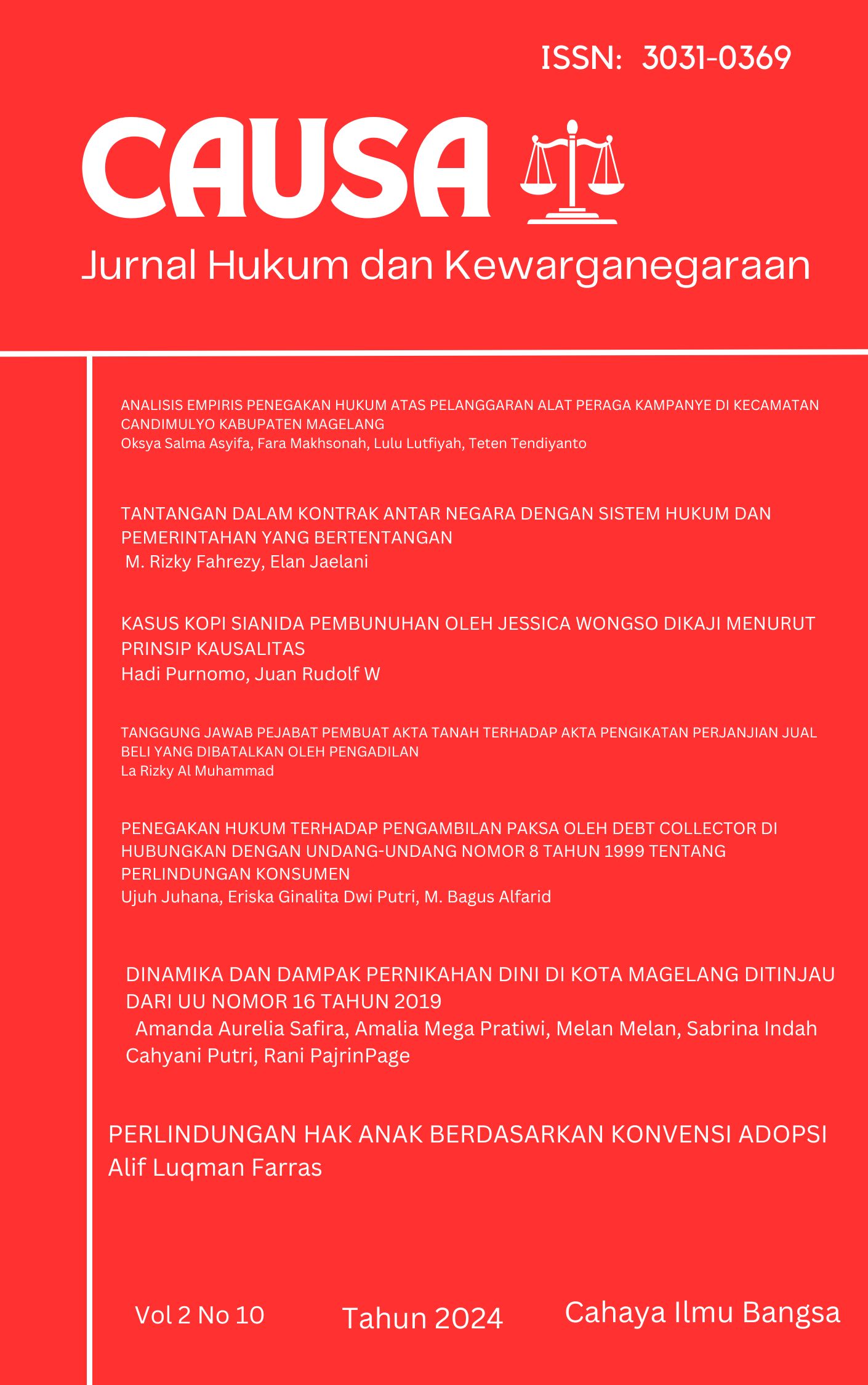ANALISIS TERHADAP IMPLEMENTASI HUKUM INTERNASIONAL DALAM PERLINDUNGAN LINGKUNGAN GLOBAL
- Authors
-
-
Irwan Triadi
Universitas Pembangunan Nasional “Veteran” JakartaAuthor -
Cantika Khoerunnisa Alrasyid
Author
-
- Keywords:
- International Law, Environmental Protection, Implementation, Multilateral Agreements
- Abstract
-
Global environmental protection has emerged as a strategic issue in modern international law. As the impacts of climate change, environmental degradation, and biodiversity loss intensify, the international community recognizes the urgency of cross-border cooperation to ensure planetary sustainability. Treaties such as the Kyoto Protocol, the Paris Agreement, and the Kunming-Montreal Global Biodiversity Framework set global norms and standards. However, their implementation remains hampered by weak law enforcement systems, inequalities in state capacities, and conflicting domestic interests. This study uses a normative juridical approach by analyzing key international legal instruments and their implementation in national contexts. The research finds that while regulatory frameworks have evolved, political will, technological limitations, and economic priorities still undermine international law’s effectiveness. Therefore, strengthening international mechanisms, enhancing transparency, and fostering multi-actor synergy are essential to ensure successful global environmental protection.
- Downloads
- Published
- 2025-06-14
- Section
- Articles
How to Cite
Most read articles by the same author(s)
- Kevin Angelo Pangaribuan, Alfa Immanuel Sede, Aria Saputra, Ronaldindo Rifky Trihandoko, Zaky Prasetio Emri, Irwan Triadi, PRAJURIT AKTIF DAN BISNIS: DINAMIKA HUKUM DALAM REVISI UU TNI ANTARA LARANGAN MUTLAK DAN USULAN LIBERALISASI , Causa: Jurnal Hukum dan Kewarganegaraan: Vol. 14 No. 1 (2025): Causa: Jurnal Hukum dan Kewarganegaraan
- Kevin Angelo Pangaribuan, Irwan Triadi, ANALISIS KOMPARATIF ASAS-ASAS HUKUM PIDANA UMUM DAN HUKUM PIDANA MILITER DALAM SISTEM PERADILAN INDONESIA , Causa: Jurnal Hukum dan Kewarganegaraan: Vol. 13 No. 8 (2025): Causa: Jurnal Hukum dan Kewarganegaraan
- Salsabilla Putri Kartini Farid, Irwan Triadi, ANALISIS SENGKETA PERBURUAN PAUS JEPANG-AUSTRALIA DAN IMPLIKASI HUKUM INTERNASIONAL , Causa: Jurnal Hukum dan Kewarganegaraan: Vol. 13 No. 12 (2025): Causa: Jurnal Hukum dan Kewarganegaraan
- Muhammad Arya Azra, Harul Surya Fernanda, Irwan Triadi, Iwan Erar Joesoef, PERLINDUNGAN HAK CIPTA TERHADAP PEMEGANG HAK CIPTA APLIKASI YANG DIPERJUALBELIKAN SECARA ILEGAL DI INTERNET , Causa: Jurnal Hukum dan Kewarganegaraan: Vol. 14 No. 6 (2025): Causa: Jurnal Hukum dan Kewarganegaraan
- Irwan Triadi, Salsabilla Putri Kartini Farid, Cantika Khoerunnisa Alrasyid, Andi Tyara Ardiningtyas, Disya Soraya Qhaira, MEKANISME PENYELESAIAN SENGKETA INTERNASIONAL DALAM KASUS TUMPAHAN MINYAK DI NIGERIA: PERAN DAN EFEKTIVITAS ORGANISASI INTERNASIONAL , Causa: Jurnal Hukum dan Kewarganegaraan: Vol. 13 No. 10 (2025): Causa: Jurnal Hukum dan Kewarganegaraan
- Irwan Triadi, Andi Tyara Ardiningtyas, PEMBAJAKAN DI PERAIRAN SOMALIA: DAMPAK GLOBAL, HUKUM INTERNASIONAL, DAN STRATEGI PENANGGULANGAN , Causa: Jurnal Hukum dan Kewarganegaraan: Vol. 14 No. 2 (2025): Causa: Jurnal Hukum dan Kewarganegaraan
Similar Articles
- Bhagawanta Atyuta Pradhana, Dwi Putri Lestarika, Wevy Efticha Sary, TINDAK PIDANA TERORISME SEBAGAI KEJAHATAN TERHADAP KEMANUSIAAN DALAM PERSPEKTIF HUKUM PIDANA INTERNASIONAL DAN YURISDIKSI MAHKAMAH PIDANA INTERNASIONAL , Causa: Jurnal Hukum dan Kewarganegaraan: Vol. 12 No. 5 (2025): Causa: Jurnal Hukum dan Kewarganegaraan
- Irwan Triadi, Andi Tyara Ardiningtyas, PEMBAJAKAN DI PERAIRAN SOMALIA: DAMPAK GLOBAL, HUKUM INTERNASIONAL, DAN STRATEGI PENANGGULANGAN , Causa: Jurnal Hukum dan Kewarganegaraan: Vol. 14 No. 2 (2025): Causa: Jurnal Hukum dan Kewarganegaraan
- Daniella Sitanggang, TAHAPAN PEMBUATAN CEDAW (CONVENTION ON THE ELIMINATION OF ALL FORM OF DISCRIMINATION AGAINST WOMEN) DAN IMPLEMENTASINYA DI INDONESIA , Causa: Jurnal Hukum dan Kewarganegaraan: Vol. 14 No. 9 (2025): Causa: Jurnal Hukum dan Kewarganegaraan
- Lazarus Katy Kole, PERLINDUNGAN HUKUM TERHADAP MEREK DAGANG DALAM ERA GLOBALISASI , Causa: Jurnal Hukum dan Kewarganegaraan: Vol. 15 No. 8 (2025): Causa: Jurnal Hukum dan Kewarganegaraan
- Irwan Triadi, Salsabilla Putri Kartini Farid, Cantika Khoerunnisa Alrasyid, Andi Tyara Ardiningtyas, Disya Soraya Qhaira, MEKANISME PENYELESAIAN SENGKETA INTERNASIONAL DALAM KASUS TUMPAHAN MINYAK DI NIGERIA: PERAN DAN EFEKTIVITAS ORGANISASI INTERNASIONAL , Causa: Jurnal Hukum dan Kewarganegaraan: Vol. 13 No. 10 (2025): Causa: Jurnal Hukum dan Kewarganegaraan
- Justika Hairani, Ali Masyhar, Cahya Wulandari, Anis Widyawati, PERTANGGUNGJAWABAN PIDANA INDIVIDU TERHADAP TINDAK PIDANA DOXXING ANTARNEGARA PERSPEKTIF HUKUM PIDANA INTERNASIONAL , Causa: Jurnal Hukum dan Kewarganegaraan: Vol. 14 No. 1 (2025): Causa: Jurnal Hukum dan Kewarganegaraan
- Yebi Febri, Gina Azhara Nabilla. R, Sona Norana Kurnia Ilahia, Salsabilah Salwa Septiani, Putri Ananda Asisti, Iskandar Iskandar, PERLINDUNGAN HUKUM TERHADAP DATA PRIBADI PELAMAR ASN DALAM PROSES REKRUTMEN CPNS/PPPK YANG MENGGUNAKAN ARTIFICIAL INTELLIEGENCE (AI) , Causa: Jurnal Hukum dan Kewarganegaraan: Vol. 13 No. 2 (2025): Causa: Jurnal Hukum dan Kewarganegaraan
- Gopin Pamungkas, Sela Monika, Devina Qhosani, Ema Septaria, M Ilham Adepio, PERLINDUNGAN KABEL BAWAH LAUT DI WILAYAH PERAIRAN INDONESIA BERDASARKAN HUKUM LAUT INTERNASIONAL DAN KERANGKA HUKUM LAUT NASIONAL , Causa: Jurnal Hukum dan Kewarganegaraan: Vol. 12 No. 9 (2025): Causa: Jurnal Hukum dan Kewarganegaraan
- Allysa Aulia Firsa, PENGARUH KEADAAN MEMAKSA (FORCE MEJURE) DALAM PERJANJIAN DAGANG INTERNASIONAL , Causa: Jurnal Hukum dan Kewarganegaraan: Vol. 15 No. 9 (2025): Causa: Jurnal Hukum dan Kewarganegaraan
- Dina Afriyanti, URGENSI REGULASI OTOPSI MEDIS SEBAGAI BUKTI HUKUM: PERSPEKTIF HUKUM FORENSIK, ETIKA KEDOKTERAN, DAN HAK ASASI MANUSIA , Causa: Jurnal Hukum dan Kewarganegaraan: Vol. 15 No. 8 (2025): Causa: Jurnal Hukum dan Kewarganegaraan
You may also start an advanced similarity search for this article.

